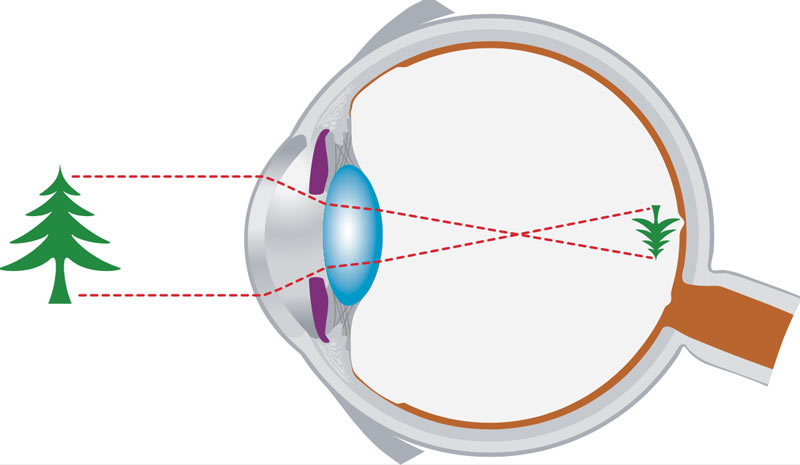By far the most common enquiry we receive from prospective patients is….
‘I would like to have laser eye surgery, but my optician has suggested a more expensive procedure called lens replacement surgery. Why can’t I just have laser?’
Laser eye surgery has become synonymous with vision correction surgery but there are different types of surgery out there. Your individual eye measurements will determine which treatment is right for you.
Laser eye surgery is a great procedure. It is fast, incredibly safe and comparably cost effective compared to lens replacement surgery and implantable lens surgery. It works by applying a short pulse of laser energy to the surface of the eye (usually only 10-15 seconds) to alter the focal point of light entering the back of the eye.
The preparation work carried out by your Consultant Ophthalmologist during your initial appointment ensures that this 10-15 second pulse of laser reshapes the cornea just the right amount to correct your focusing.

How the eye makes an image
Within the eye, the cornea and lens work together as a system to ensure incoming light rays are focused onto the surface of the retina. When vision is perfect, the cornea and the lens work optimally to project the image to the back of the eye. If there is a slight imbalance between the lens, the cornea or the length of the eye, then focus will be slightly reduced. The resulting ‘blur’ is referred to as a refractive error.
The most common refractive errors
The three most common types of refractive error which may be suitable for laser eye surgery are myopia (short sightedness), hyperopia (long sightedness) and astigmatism caused by distorted cornea or lens shape.
What does laser eye surgery do?
Laser eye surgery is great at correcting vision when reshaping of the corneal curvature is required. In a short-sighted eye, the overall eye size is too large, and focusing occurs before light reaches the retina. Laser induced flattening of the corneal curve addresses this issue. Patients with myopia, hyperopia or astigmatism with stable prescriptions will be good candidates for laser eye surgery. However, as laser eye surgery works by reshaping the surface of the cornea, it will not be a useful treatment if the cause of faulty vision occurs elsewhere in the eye, for example cataract formation.
When might laser work less well?
If you have an unstable prescription, your ophthalmologist will be cautious about the efficacy of laser eye surgery. The treatment is designed to correct your prescription, but if this changes, as it often does in those under 20 years of age, there may only be limited benefits to treatment. If this is the case, a good ophthalmologist will check your refraction annually until your prescription is stable.
Laser eye surgery will also have limited benefit for those over 40 years of age. As we get older, vision deteriorates for reasons other than refractive error. In young adults, the lens inside the eye is supple and powerful. It has the ability to change shape with ease. This allows us to quickly change the way we focus from distance to near. But as we age, the natural lens becomes stiffer and its ability to change shape deteriorates. Eyesight suffers because the lens cannot work as an efficient system with the cornea in the way it once could, and images may start to appear blurry for people who have had perfect vision their whole lives. Termed presbyopia, it is the reason why people in their late 30s or early 40’s find that for the first time in their lives they require reading glasses.
If presbyopia is the cause of poor vision then unfortunately laser eye surgery will not help. In order to correct an error in the lens, you will need a procedure that removes the natural lens and replaces it with a new artificial lens. Referred to as lens replacement surgery or refractive lens exchange (RLE), this method of vision correction can give a new lease of life to those no longer suitable for laser eye surgery.
What is involved in Lens replacement surgery?
During RLE, the natural lens is removed with the use of an ultrasound probe. The probe is gently inserted into the eye where the ultrasound waves are used to breakdown the tissue of the presbyopic lens. In its place, an artificial lens is implanted. This artificial lens is custom ordered to match your prescription so that the new lens can return your vision back to 20/20 or better. Lens replacement surgery is similar to the procedure used in cataract surgery, so anyone undergoing lens replacement will never develop cataracts in the future.
This is the reason our surgeons will rarely recommend laser eye surgery for people over 40 years of age. Although immediate results from laser eye surgery may be impressive and the costs are attractive, the risk is your vision improvement may be short lived once you have a few more years under your belt.
Advice for anyone considering vision correction surgery
Always compare the risks and benefits of the procedures available to you before undergoing treatment. Understand how long the treatment will last for; is it a permanent fix or is vision likely to deteriorate over the next few years?
Don’t base a decision on cost alone. Whilst everyone has their budget, some procedures would simply are short lived and a false economy. It’s really important to select the procedure that is right for your eyes and will work in the long term as well as the short term.
Be wary of clinics or consultants that can only offer laser eye surgery. Select a clinic and consultant that offers all available treatment options to ensure you are offered what is right for you rather than what the clinic / consultant can offer.
Prior to any procedure, you should always undergo a full and detailed examination of your eyes with an experienced optometrist or ophthalmologist. The diagnostic tests they take you through will determine whether you are a good candidate for laser eye surgery or lens replacement surgery. They will also consider your lifestyle, career, prescription stability, medical history, age, corneal thickness, shape and curvature, pupil size and dry eyes.


